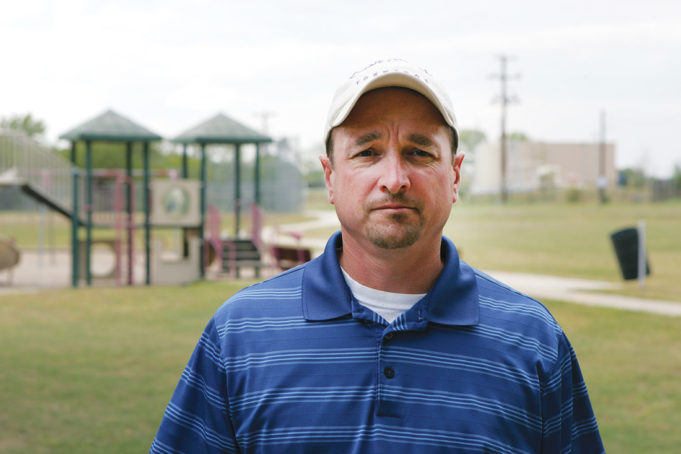When the landmen arrived in Fort Worth in 2007, they didn’t promise that every home owner would make a killing from leasing his or her land for natural gas exploration. But they did promise that every house would be getting free mailbox money monthly for 30 to 50 years, maybe a couple of hundred bucks per home, even if that home sat on only a 6,000-square-foot plot.
Over the next several years, the wells that those landmen dreamed about were put in, and when the price of natural gas was high, above $10 per 1,000 cubic feet or 1 million British Thermal Units, there actually was some mailbox money. Not quite as high as the landmen projected — some people with 6,000-foot plots received only a $100 check every two years or so — but for folks with an acre or more, the money arrived monthly.
That money has nearly stopped arriving for most people. Part of that is due to the current price of natural gas, which has dropped by 80 percent during the past several years, though that alone cannot explain the much more dramatic drop in royalty monies.
So what happened?
“Well, basically the wells ran dry,” explained a gas company insider who did not want his name used. “In the Barnett Shale, you have a great first year with a well. The second-year production drops by half. The third year, it drops by half again, and from there, which is 25 percent of initial production, it just peters out over the next several years.”
In other words, by the time most gas wells in the Barnett Shale became as old as a kindergartener, the gas nearly stopped flowing, turning the 30-50-year-plan into about five years.
“I was told I would get $5,000 a month for 30 years on my half-share of the minerals on 42 acres,” said Sharon Wilson, who became a fierce opponent of natural gas drilling as the negatives involved with extraction methods became evident. Those include the use of poisons mixed with water to open the shale formations, leaking wells that poisoned ground water sources, enormous volumes of toxic gasses released into the air from nearly every completed well in the Barnett, the list goes on.
Wilson said her initial checks, which first came in 2010, were in the $1,000 range, but they have since dropped to $100 a month with some months not bringing any mailbox money at all.
“Once I found out about all the damage the drilling was doing,” she said, “I tried to warn people that they were trading away their serenity, their peace of mind, their environment for nothing, but the promises the industry made were hard for people to ignore.”
Harriet Irvy, a community activist, owns eight properties in Arlington that have a combined area of about 2.5 acres. She receives royalties from two wells, one drilled seven years ago, one six years ago.
“The first couple of years were good,” she said, “but it went downhill fast. Four years ago, that dropped to just $2,000-plus for the year, and last year that was down to $528. Now I don’t want to say I didn’t enjoy their money, but I don’t like them. I don’t like that the landmen promised royalties for 30 to 50 years, and that’s not happening. I don’t like the pollution from the wells. The gas companies just never cared about people or their health.”
Calvin Tillman, the former mayor of DISH, the very epicenter of the Barnett Shale, said that it didn’t take long to discover that the amounts produced by a well in its first years were more than it would churn out for the rest of the well’s life.
“And people are left with nothing,” he said. “A number of people in DISH thought they could depend on that income, and lots of people are in trouble because of that.”
In DISH, not only has the money dried up but the concentration of wells and other gas equipment caused a large number of residents to have nosebleeds, headaches, and in some cases serious neurological disorders. Tillman moved his family out of DISH when his children began to get sick.
“The people still in DISH are left with a mess,” he said. “Those who bought into it and allowed wells to be drilled on their property now have worthless property because they’ve basically got a hazardous waste site there.”
Not everyone is upset. Cindy Vasquez, a spokesperson for the City of Fort Worth, noted that while royalties have dropped, “the city is still generating revenue due to the high amount of acreage that is leased.”
She added that all told, Fort Worth has generated $260 million from the gas industry, “money that goes to benefit capital projects and trusts.”
Fort Worth’s Don Young, who fought gas drilling in Fort Worth from the first day the landmen arrived, remembered former Fort Worth Mayor Mike Moncrief — a huge booster of the industry — saying that the gas money would float everyone’s boat in town.
“And yet homelessness is up,” Young said. “We’ve lost thousands of acres of green space in the city, there’s been a dire effect on wildlife, we’ve had earthquakes, and we still have toxic gas escaping from all those wells. The gas drilling has really been a tragedy, to be honest.”
Neither Devon Energy, the biggest driller in the Barnett Shale, nor Ed Ireland, director of the industry-sponsored Barnett Shale Energy Education Council, would answer the question of whether the rapid decline in gas production was anticipated even while landmen were making their 30/50 promises.
Devon Energy did publish its 2015 Operations Report. In the section on the Barnett Shale, it was noted that the company had tested re-fracking 25 wells in 2015 with good result and that the company was poised to “restart [large-scale re-fracking] when conditions incentivize higher activity.”
Young was not surprised by Devon’s assessment. “I think the gas companies are all just going to hunker down and try to wait things out until the price of gas goes back up,” he said. “That would bring back more fracking and re-fracking than we had before. The whole thing is really ugly. They lied about the life of the wells, they lied about the impact they would have on Fort Worth, they lied about the mailbox money.”
Irvy agrees: “All I know,” she said, “is that the gas money is gone and the gas is gone, too.”













I am a former landman. I never EVER promised people what amount of money they would receive monthly, or for how long. What I did say was they would receive royalties for the life of the well, and depending on the production, stock price, and acreage, it could be a little or substantial. I also put amendments in my lease agreements that protected the landowner. Not all landmen are horrible “snake oil salesmen.” I actually cared. Regardless, it is never smart to sign a piece of paper if you are unsure about the agreement, it is everyone’s personal responsibility to educate themselves and/or seek council.
I seriously doubt any landman promised a dollar amount. How could they possibly know that? Isn’t it the landman’s job to get the lease signed and at the lowest royalty percentage they can get? Landmen sell the promise of what a person COULD get, but I don’t think many people hear that. While there have been some people who became millionaires, I’ve met quite a few who got very little.
It’s also quite telling that the usual mouthpieces who always have something to say when they control the narrative are completely silent on this.
Chesapeake’s landmen actually DID promise significant mailbox money to homeowners in our North Texas city’s neighborhoods (in the range of $350 a month) – and all of it for about 1/5 of an acre (basically their home & their front yard and back yard.) Certainly most never consulted an attorney. But during the early heyday (especially 2006-2010) the rumors and competition among neighborhoods to “get a better lease” were all the rage.
Chesapeake’s landmen actually DID promise significant mailbox money to homeowners in our North Texas city’s neighborhoods (in the range of $350 a month) – and all of it for about 1/5 of an acre (basically their home & their front yard and back yard.) Certainly most never consulted an attorney. But during the heyday, the rumors and competition among neighborhoods to “get a better lease” were all the rage.
A clause often seen in contracts is the “merger” clause. It provides that ALL terms of agreement are contained in the written contract. It bars parties from later asserting additional terms not contained in their written contracts.
I’m betting that the leases signed by the complainants in the article contain merger clauses with no promises such as how much per year a lease will pay or how long it will pay. Any lawyer would have advised the complainants not to rely on promises omitted from their leases.
I am a Landman and leased acreage in Tarrant & Dallas County for the development of Barnett Shale drilling back in 2006-2012. The life of an oil & gas well is fundamentally based on the price of the commodity, in this case natural gas. In 2007-2008, natural gas was between $6-$13/mcf; today it is $1.75/mcf. In this market, the lease operating cost is greater than the profit and therefore is uneconomical after the flush production is gone. Everyone in 2007 was drawing their production curves out 20-30 years based on the price of natural gas at the time. If you ran those economics now, you wouldn’t drill 95% of the wells in the Barnett Shale because it wouldn’t pay out at $2/mcf. The Landmen telling mineral owners they will receive crazy $$$ for 30 years probably were not risking the commodity price and may have even been reaching on production volume to entice mineral owners to lease. However, to vilify the industry and specifically Landmen because the wells aren’t paying out is not entirely fair in my opinion. How were Landmen to know that the price of natural gas would drop by 80%?
“How was I, a simple Landman, to know that the commodity price would drop?” Hmmmm. Sounds positively Clintonian in parsing the difference between willful ignorance and an outright lie.
Let’s see, flood the market with a vast, seemingly limitless supply of a commodity in a way not previously available, from not only the Barnett, but essentially from EVERY known gas field in the U.S. (and let’s not forget, geologists have known about these gas reserves for DECADES), and gee, the price drops- Well, who’da thunk THAT?!!! Supply and Demand, radical concept that helpless Landman could certainly never see coming, right?
It was always a lie, there were a fair number of us who knew it was a lie, but unfortunately lacked the ability to buy at wholesale, ad campaigns and politicians.
People need to remember this travesty when the Railroad Commission comes up for Sunset Review in the next Legislative Session in Austin.
“All I know,” she said, “is that the gas money is gone and the gas is gone, too.”
So Is Aubrey McClendon.
Gorman, you need to brush up on journalism. Your comment makes no sense.
1) I am not Gorman, 2) Chesapeake Energy’s Aubrey McClendon was indicted by the feds Tuesday for anti-trust leasing violations (has to do with mailbox money, BTW), 3) he killed himself yesterday by driving into a bridge abutment in OKC 4) you need to brush up on your ability to pay attn to things Robert K. and read a little news before commenting.
Anyone that believed gas royalties would last 30 or 50 years was foolish and uninformed. It is doubtful the life of any well can be predicted with certainty, and it is obvious from the contracts we signed that any well could be and would likely be shut-in when production was no longer profitable. That is the situation today. If you are surprised, you have yourself to blame. These facts were widely known and discussed during the active leasing days.
Randy, false info or, lies, were widely spread by landmen and fracking executives in the early days. A guy from Four Sevens, a geologist mind you, spoke at our neighborhood meeting and said the wells may last 100 years. With a straight face. I think it’s foolish to expect every day folks to know any better since this was all new and the frackholes were supposed to be experts. Naturally, the neighborhood association bought it even though I was waving my arms, pleading, Just Say No.
Very true, Don. I never heard any landmen saying they had no idea how long this might last. My wife and I were told 50 years at the very least, and probably 100 years. Of course now, they all come forward saying we never GUARANTEED anything, and technically they didn’t. But at the time they were all drinking their Aubrey McClendon Kool-Aid and passing the glass on to us. Aubrey himself decided a few days ago he’d been pushing a complete falsehood on too many people for too long and decided to take care of things. RIP OKC Preppie.
There’s a gray area between puffery, that is, wildly exaggerated promotional claims; and outright lies. The Weekly, writer Peter Gorman, and many of their readers, are of the liberal persuasion. I wonder if all who say gas companies and intermediaries “lied” about the benefits of leasing also agree that President Obama “lied” in his oft-repeated claim, “You can keep your doctor. You can keep your plan.”
How is reporting on how lease money ain’t rolling in like people said it would liberal reporting? it is a fact that 1) landmen estimated the life of the wells as being far longer than they are and persuaded people to sign based on that assumption (Gorman never wrote they “lied”), 2) the wells drying up fast combined with a glut on the market drove down price and that caused 3) mailbox money to not be much of anything right now. How is writing about that trend liberal in some way. Ever read the Wall Street Journal Robert K? They do stories like this all the time. About how trends and investments in new ideas or products didn’t quite work out the way people thought they would. The WSJ is pretty conservative in some people’s minds’ and they do stories like this all the time, and even have done stories on this very subject. So again, how does liberal come into play here Robert K? (and as usual, you use the idiotic Obamacare comparison, as if everything in world history has some comparative axis that joins it to Obamacare. Come up with something better, next time, OK?)
Gorman has written profusely on natural gas, none of it favoring gas companies. He has written on excessive toxicity and people getting cancer. Regulatory agencies in cahoots with gas companies. Lessors getting cheated in royalty payments. Pipeline leaks. Heavy trucks tearing up roads. Tremors. On and on ad nauseam. The left is in general hostile to fossil fuels and big business. That’s my opinion.
But assume I’m 100% wrong. I can tell you this: Your suggestion that my example is idiotic because it supposes that everything in world history is somehow relatable to Obamacare is a “straw man” argument; that is, it exaggerates my position such that you can readily defeat it. You prefer not to answer my question, so you mock it. You’re a lib, aren’t you?
By the way, last time I checked Johnson County Assessor records, it looked like writer Peter Gorman had some gas leases himself. Eek! Did he contribute to cancer in little children?
Not a lib, no, more of a Tory, as I am loyalist to the British monarchy. As for Gorman, I suppose that yes he does contribute to cancer in little children, as that is what journalists do when they poison the minds of people with trashy writing like this. It festers among us a bad energy company CEO who can’t figure out what to do with his ill gotten gains so he drives his car into a bridge to avoid having to do the honorable thing and take his punishment.
Robert K: Hello, Gorman here. Yes, my 1.4 acres or so is tied into a lease out here in bucolic Joshua. And yes, I’ve written some harsh truths about the gas industry. But the gas industry brought it on itself with its refusal to close-loop wells to prevent escaping poisonous gas, with its refusal to recycle its water, with its dependence on open waste pits, with flaring off gas into our air, with lying about setback importance and a host of other things. (There are a few exceptions to those things, and they were reported on as well.) Journalists do not invent the news, we report on it as best we can, getting all sides. Some stories tend to look one-sided, I’ll agree, but that’s often the result of the people on one side of the issue, in this case the gas companies, not responding to questions from journalists.
Robert K: I leased the rights in 2003, about six months after I moved to Texas. I had little knowledge but looked into things and the well is out here in the country, so wasn’t an issue with me at the time. As the drilling moved into the city, a host of issues arose that had never existed before in an urban environment. To imagine that drilling in the country is the same as putting gathering pipes under front lawns is just muddled thinking. And once I discovered–though I’d put a rider in my lease that said no pipes, no eminent domain, ever, regardless of future buyer–that people’s property was being made useless by pipes crossing their land, I wish I’d have not signed the lease. Yes, I took the bonus money–$400–and bought a lawn mower, so that i could mow my new 1.4 acres. I never tried to hide that. And what I write in my blog are personal feelings. What I give an editor to print are facts without my personal feelings involved. I’m sure you can understand the difference. Thanks for reading my blog. I hope you enjoy it.
but it is often the result of the people on one side of this issue, in this case the gas companies, lying LIKE A RUG, AND PRETENDING THEY ARE NORMAL, CAREING MODELS FOR OUR PRECIOUS CHILDREN, WHEN EVEN A BLIND FIFTH- GRADER CAN SEE THROUGH THEIR SELFISH, BLACK-HEARTED AVARICE.
“Journalists do not invent the news, we report on it as best we can, getting all sides. Some stories tend to look one-sided, I’ll agree, but that’s often the result of the people on one side of the issue, . . . not responding to questions from journalists.”
Mr. Gorman, you wrote the following week’s article: “Leaving a Void.” The comments assert that you failed to get the facts on (1) whether stealing electricity is a crime, and (2) whether cold weather justified the deceased’s illegal act of turning on his neighbor’s electricity.
So where did you get these facts and what did you do to confirm them?
Little man Tillman is all wrong and a jerk with a Napoleonic complex which is only a little smaller than Donald Trump. If the gas is all gone then why are natural gas prices at a 17 year low? Everyone who had a brain knows these wells decline, but when re-fracked will resume producing. That is why it is called a tight gas reservoir. Perhaps Tillman and Sauron can power the needs of the country with all their hot air which knows no bounds, especially since Sauron has always been paid a fat salary by Earthworks, which would like to see all mankind go back to the stone age. Of course all the meth heads who read the FW Weekly will believe anything.
http://www.pnas.org/content/110/49/19731.full
Dan: As a loyal FW Weekly reader and a patriotic American to boot, I would like to quote from Patrick Henry:
“What is it that gentlemen wish? What would they have? Is life so dear, or peace so sweet, as to be purchased at the price of gas leases and air quality? Forbid it, Almighty God! I know not what course others may take; but as for me, give me librium or give me meth!”